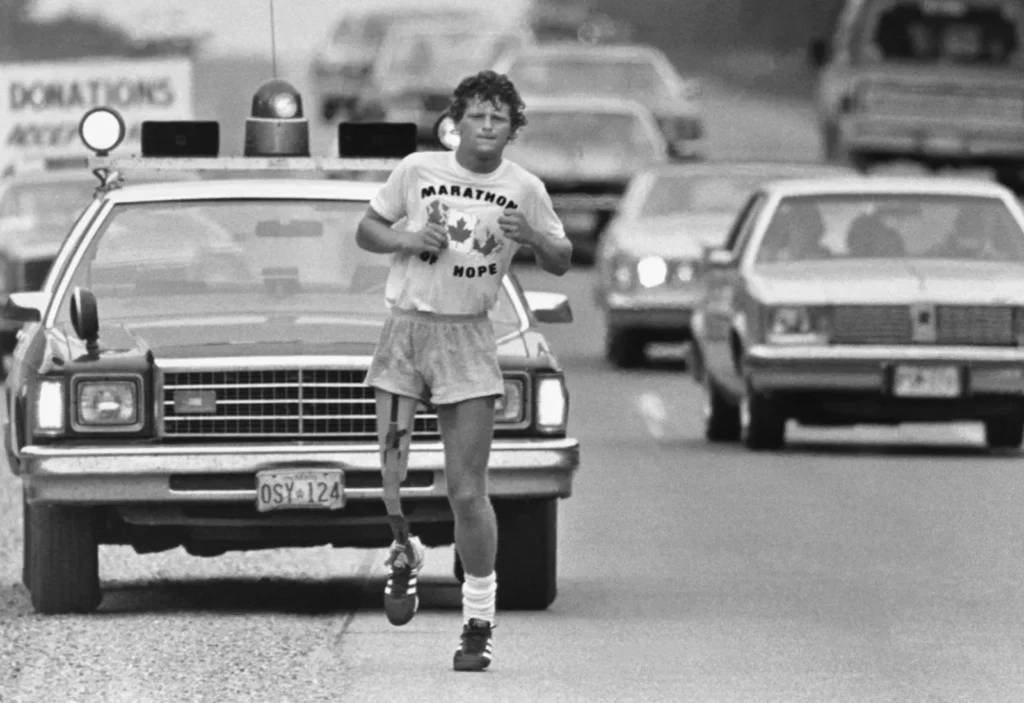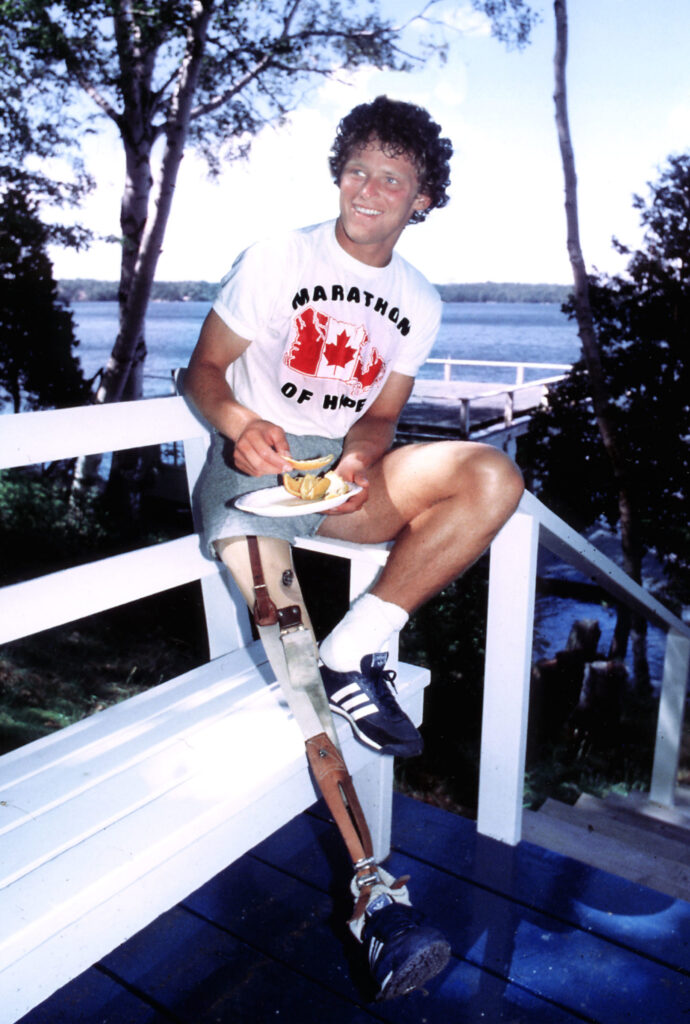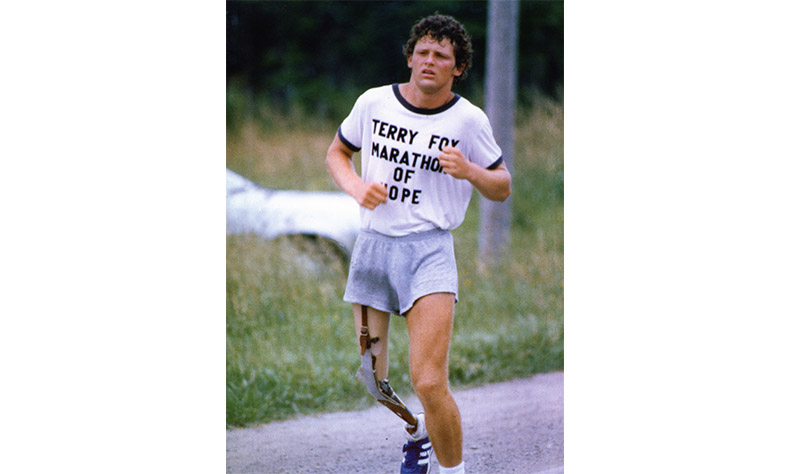Some called him the one-legged Forrest Gump, the man who began to run across an entire country after having his leg amputated. Some even believe that the scene in Forrest Gump where he runs from coast to coast was inspired by this courageous individual.
His name was Terry Fox, a Canadian-born athlete who loved to run and compete. When Fox was just 18, he was diagnosed with osteogenic sarcoma, a type of bone cancer that begins at the knee. As a result, he had to have his right leg amputated six inches above the kneecap.
Fox was hospitalized and had to undergo chemotherapy for over a year. However, he kept a positive outlook on life and made a life-altering decision to do all that he could to raise money for cancer awareness, inspired by other children in the hospital who were fighting for their lives.
What did Fox do next? Once he got his “magic legs,” he just started running. Within four months, Fox raised over $1 million for cancer research, and despite a tragic ending to his life, he became one of the world’s greatest heroes that the country still remembers today.

Fox’s Early Life
Fox was born on July 28, 1958, in Winnipeg, Manitoba, but eight years into his childhood he moved to British Columbia. He immediately gained a strong passion for sports, and his father often cited how competitive he was as a young boy. Despite his small size, Fox excelled as a basketball player and also a cross-country winner, leading him to win Athlete of the Year at his high school.
When Fox was 18, he enrolled in college and was part of the junior basketball team at Simon Fraser University. One day when he was driving home, he crashed into the back of a pickup truck. Fox injured his right knee in the crash but didn’t think much more of it and kept playing basketball, expecting the pain to eventually go away.
Unfortunately, the pain only got worse to the point where Fox knew he had to get it checked out. The diagnosis was much worse than Fox ever imagined, as doctors told him he had a type of bone cancer that begins around the knees, called osteogenic sarcoma.
There was disagreement between the doctors as to Fox about what caused it; Fox believed the car accident led to it while doctors disagreed. When doctors said what they had to do to his leg for him to beat cancer, Fox went into utter shock.
Battle With Cancer
Fox was told that surgeons had to amputate his right leg, all the way up to the high thigh area. After amputation, he would immediately need to start chemotherapy. From there, he had a 50 percent to survive and live. Thanks to recent cancer research, he had a much better chance than if this would have happened two years ago.

Fox went through 16 months of chemotherapy, but according to doctors, what helped him survive was how positive he was. Most people would have become depressed and upset at this bad stroke of luck, but Fox took the complete approach, always smiling and staying upbeat. He was given an artificial leg, and just three weeks after starting chemo, he was walking around.
Fox found ways to adapt. He was asked to join a Canadian wheelchair basketball team, and after a few months of practice, he helped Edmonton win the national championship and was named to the All-Star team. He continued to get better at it and won two more national titles before he became extremely ill and couldn’t play anymore.
Marathon of Hope
While basketball was an important activity for Fox, it was running where he made the biggest impact. While in the hospital recovering from chemotherapy, Fox was motivated to do something inspirational to help others fight cancer, particularly children. He decided to do a marathon run from coast to coast that would raise money for cancer research. He would name the initiative Marathon of Hope.
To prepare for the marathon, Fox practiced running with his artificial leg. For 18 months, he ran 3,107 miles (5,000 km) to prepare for the journey. On April 12, 1980, Fox began in the extreme northeast part of Canada in St. John’s, New Foundland, with the purpose of running across the country.
When the run started, not many people knew about it and the money for cancer research started slow. But word slowly began to spread and got in the media. By the time Fox was just a quarter of the way across Canada, he was a national phenomenon and people were flooding to the streets to see him. His cause gained massive media attention and every day, more and more people donated.

Fox ran approximately 26 miles per day, going through Quebec and Ontario. People lined up along the streets to greet him as he passed by and others joined him for several miles as he ran along the highway. In Toronto, a crowd of 100,000 greeted him when he entered the city. It was estimated that the day he entered Toronto, they raised more than $100,000 in donations in the city alone. He was met by famous athletes, including Hockey Hall of Famer Bobby Orr.
Despite taking a few hours to rest or sleep, Fox refused to take a day off despite his hurting body. Soon, he began coughing vehemently and had to get checked out by the doctor. On Sept. 1, 143 days into his journey, he found out his cancer had spread into his lungs. But while his running had to slow down because his condition worsened, the cause didn’t.
Despite passing away on June 28, 1981, at just 22 years old, Fox had begun a nationwide tradition. He started the run to fight for cancer awareness and the people helped him finish it. Canada now annually holds the Terry Fox Run which goes from coast to coast in Canada with millions participating and helping raise money for cancer research.
Terry Fox’s Legacy
Terry Fox was an inspiration to many, and to this day, he’s remembered as a national hero. He was the youngest person to ever be named a Companion of the Order of Canada. There are also 14 roads, 15 schools, and a 52-mile section of the Trans-Canada Highway named after him.
Millions of people in upwards of 30 countries participate every year in the Terry Fox Run along with other fundraising events in his name. In 1999, a national survey named Fox as “Canada’s Greatest Hero,” and he finished second only to Tommy Douglas in 2004 when the award for “The Greatest Canadian” was handed out.
In that first year of running, Fox raised nearly $2 million. Today, more than $900 million has been raised in Fox’s name for cancer research thanks to what he started.

